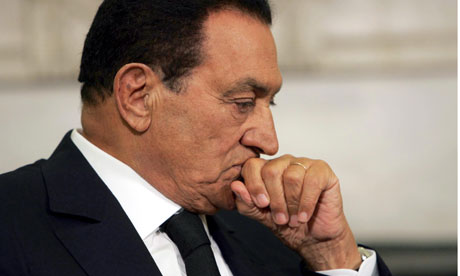Egyptian court orders Hosni Mubarak retrial
Decision to retry ousted president, interior minister and aides may help repair President Mohamed Morsi's standing
Abdel-Rahman Hussein in Cairo
guardian.co.uk, Sunday 13 January 2013

Hosni Mubarak: Egyptian doctors say the former president's heart condition means he is too ill to be held in jail while awaiting trial. Photograph: Dennis Brack/EPA
Former Egyptian president Hosni Mubarak will be retried for the killing of protesters during the uprising that ousted him after a Cairo court accepted his appeal.
Mubarak will be retried alongside his then interior minister, Habib el-Adly, who along with the former president was sentenced to a life term last July for failing to prevent the killing of protesters by security forces. Six of Adly's aides who were acquitted in the initial trial will also be retried.
Mubarak will remain under arrest on charges recently brought against him concerning the millions of Egyptian pounds that he and others received as gifts from the country's biggest state-owned newspaper, al-Ahram. Also acquitted in the initial trial were Mubarak's sons, Alaa and king-in-waiting Gamal. They remain in jail on other charges relating to financial crimes and abuse of power.
News of the retrial was greeted by both Mubarak's opponents and his few remaining supporters. For his supporters – who celebrated the court decision – the retrial offers the hope that the former dictator will be able to spend his remaining years outside the military hospital in which he resides. For opponents, it represents a chance to build a stronger case against him and his police commanders for the violence perpetrated against protesters.
It may also present an opportunity for Mubarak's successor, the Muslim Brotherhood's Mohamed Morsi. The beleaguered Morsi needs strong convictions against the Mubarak coterie, especially as most of the police chiefs on the ground during the January 2011 revolt have been acquitted.
In the contentious decree he issued last November, Morsi ordered the retrial of Mubarak and other former regime stalwarts, only to be told that by law new evidence was needed to trigger a retrial.
An independent fact-finding commission has since found that – contrary to defence claims during the trial – Mubarak knew of the killings via a live feed he watched at the presidential palace.
Morsi also contentiously removed Egypt's public prosecutor, replacing him with his own appointment. Since Egyptian law prevented the dismissal of the public prosecutor, Morsi changed the law that governed the appointment, a move that was seen as an attack on the independence of the judiciary.
Egypt's prosecution service had been severely criticised for not building strong enough cases against members of the Mubarak regime, and many blamed the public prosecutor, a Mubarak appointment.
However, Morsi's move did not have the requisite populist effect as the decree also included law articles that granted him extraordinary powers and judicial immunity, privileges he extended to a constituent assembly that drafted Egypt's constitution.
The constitution passed in a referendum amid much protest and polarisation, damaging Morsi's standing. His supporters hope a stronger conviction in the Mubarak trial would repair some of the damage.
No comments:
Post a Comment